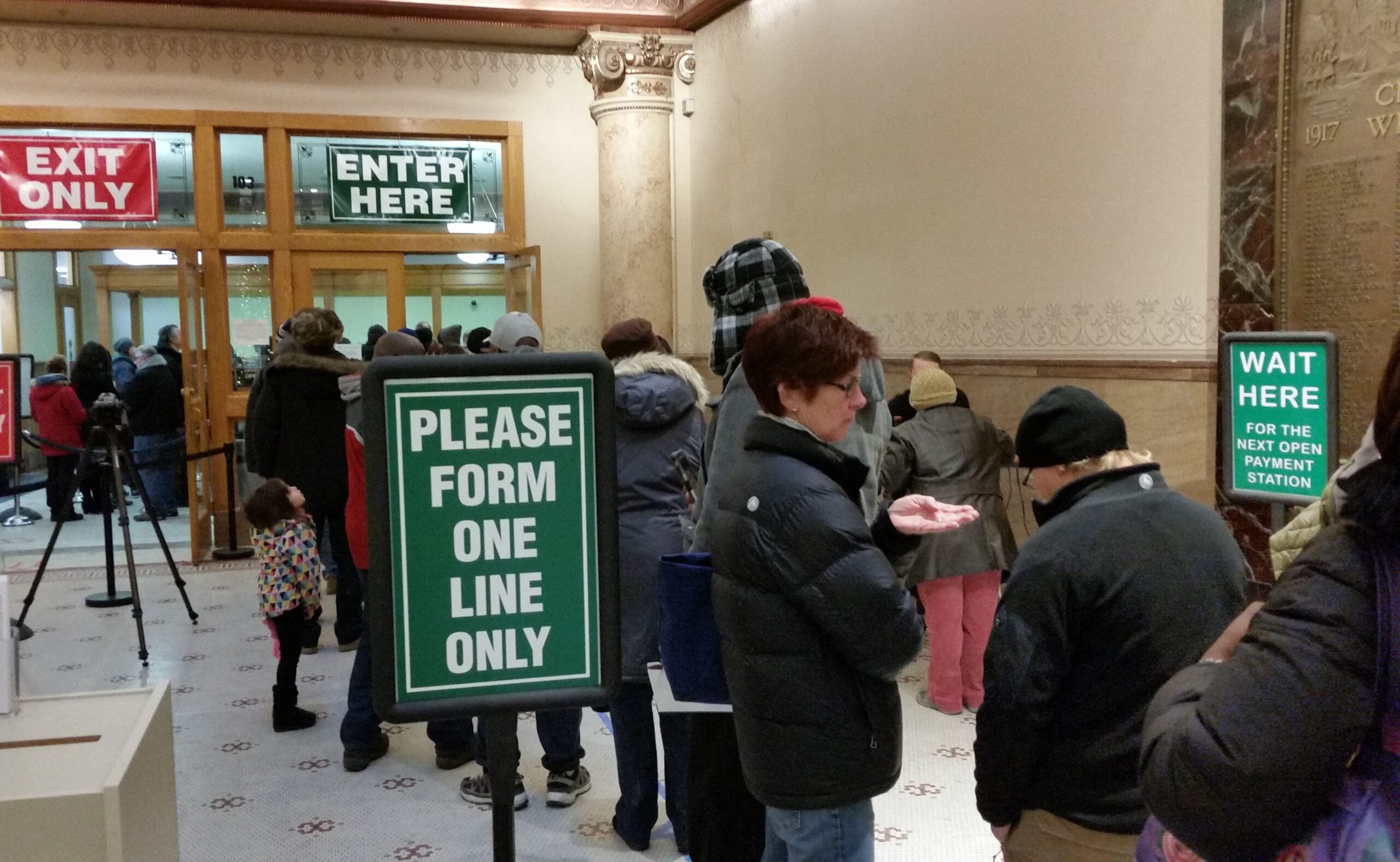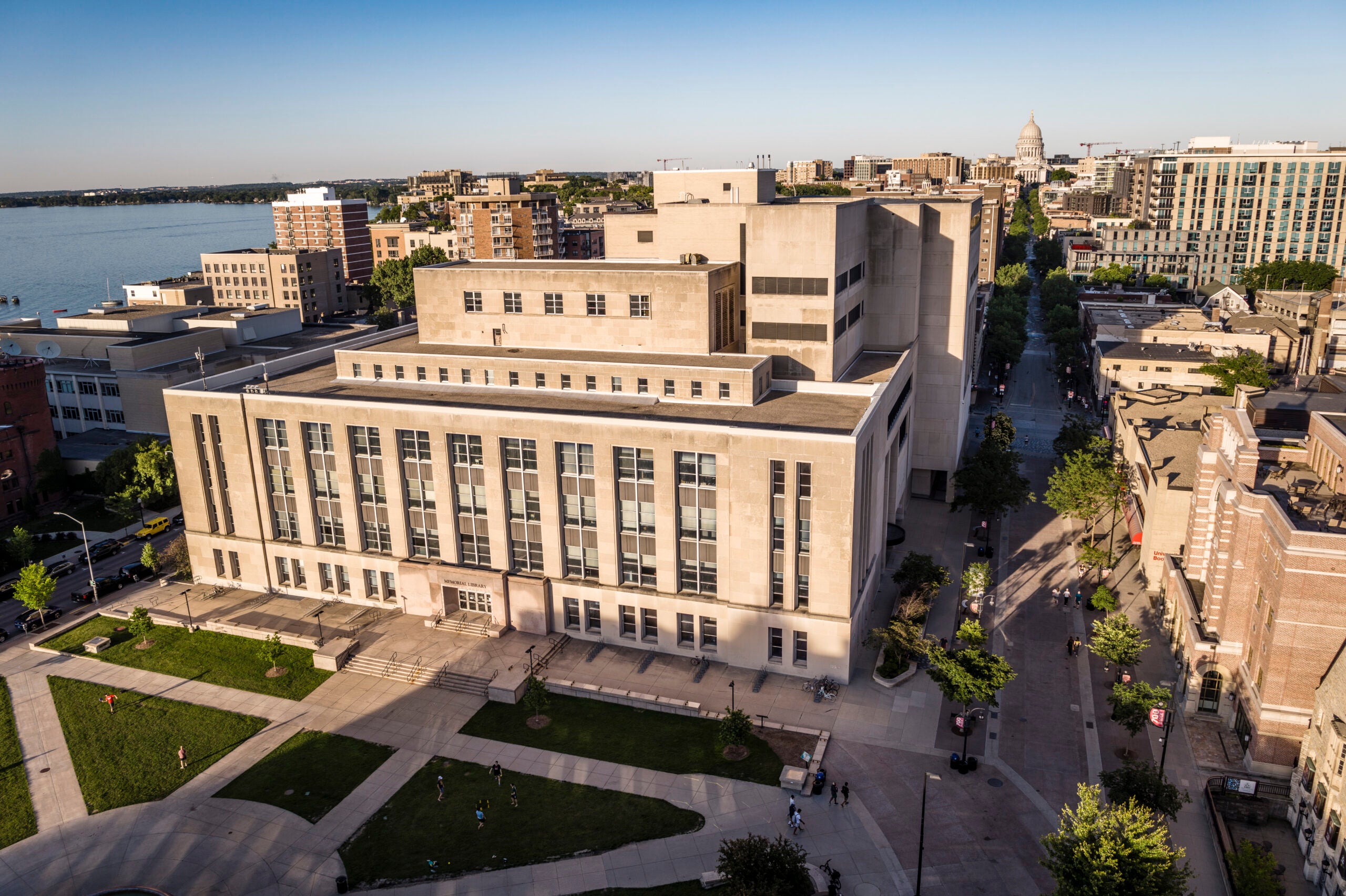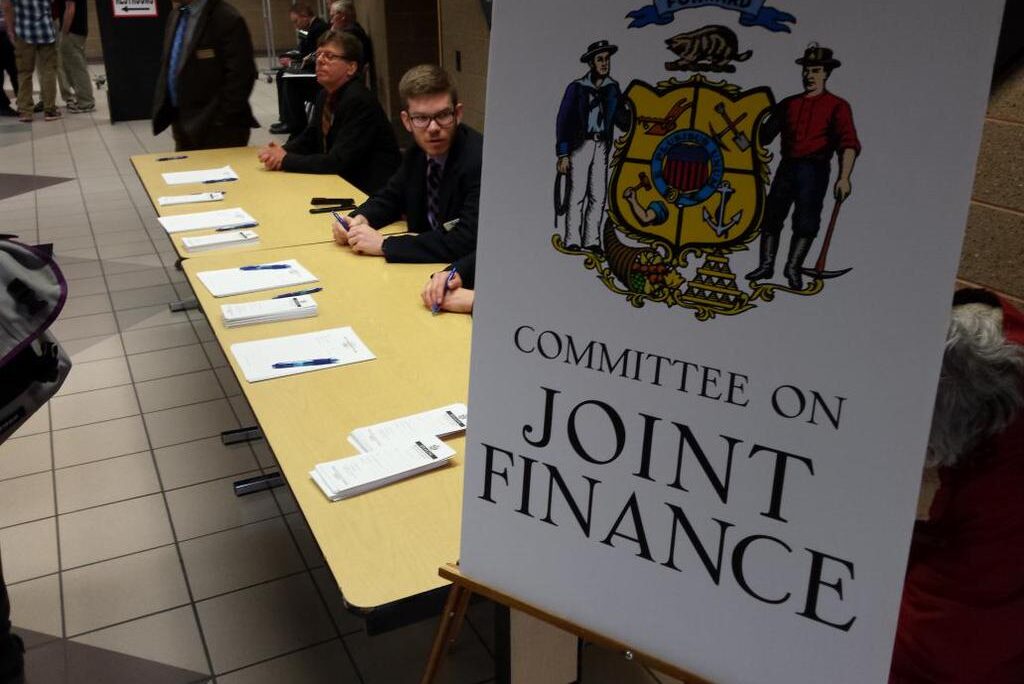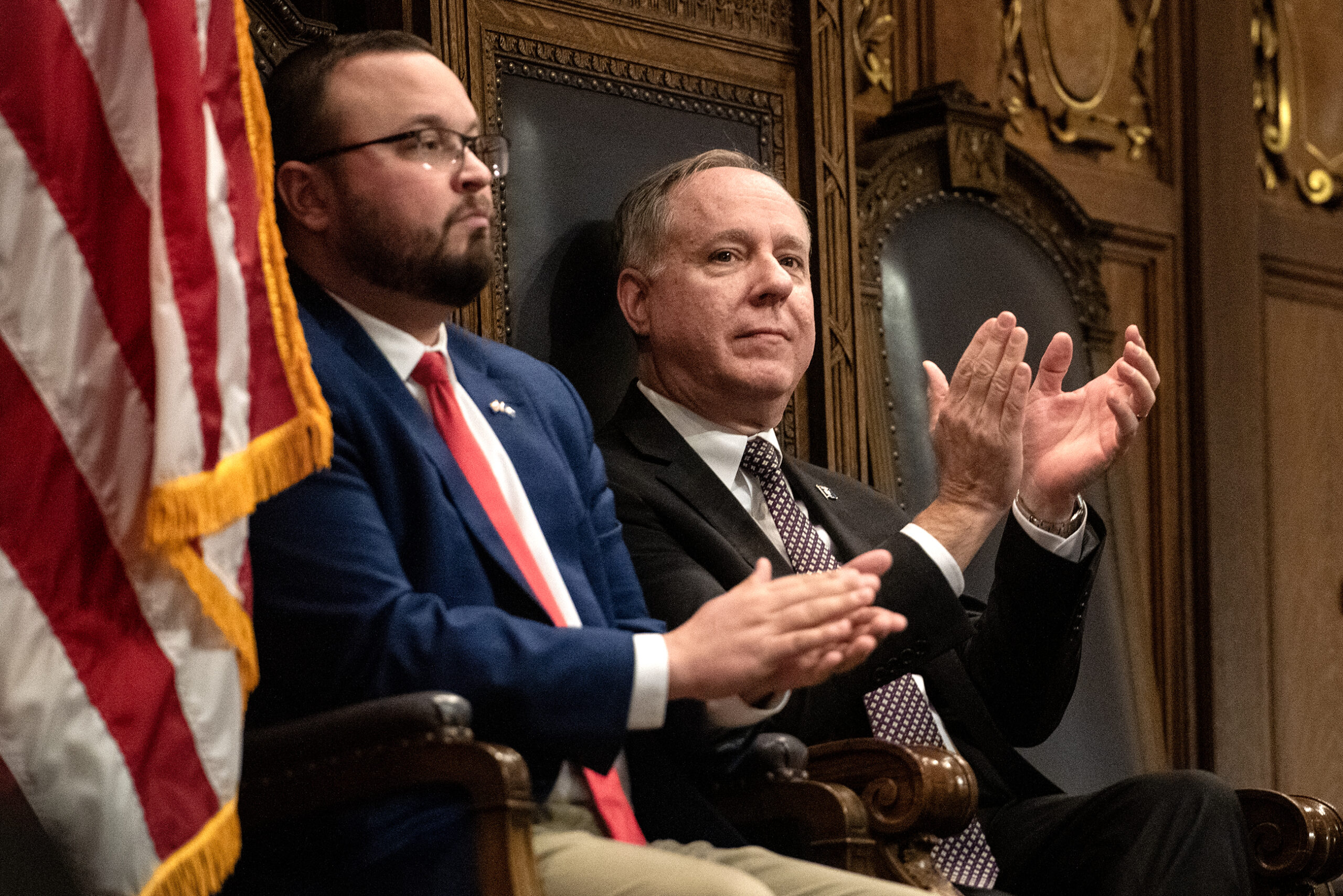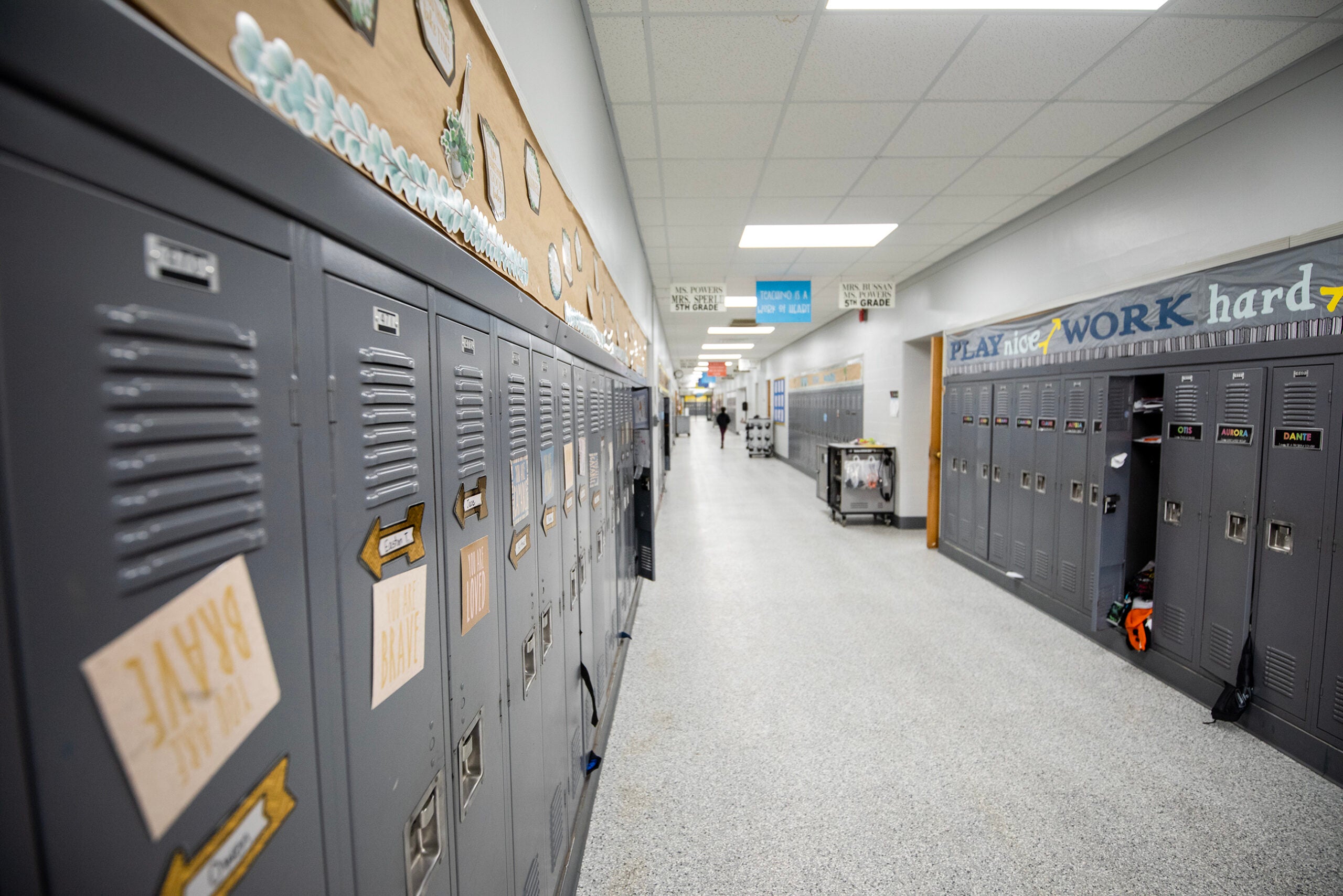Republicans on the Legislature’s budget committee passed their version of the state’s two-year spending plan Thursday night, one that would cut income taxes by $3.5 billion across all brackets, including for the state’s wealthiest residents.
At the same time, Republicans voted to cut state funding for the University of Wisconsin System by $32 million while forcing the UW to eliminate nearly 190 jobs associated with Diversity, Equity and Inclusion, or DEI.
Both moves underscored some of the sharpest differences between the parties at a time when Wisconsin’s projected surplus is as large as it’s ever been.
News with a little more humanity
WPR’s “Wisconsin Today” newsletter keeps you connected to the state you love without feeling overwhelmed. No paywall. No agenda. No corporate filter.
“We believe this is a historic budget,” said Sen. Howard Marklein, R-Spring Green, one of the co-chairs of the Legislature’s budget committee. “We invest historic amounts of money in our core priorities while also providing for a historic tax cut.”
But Democrats said the money Republicans devoted to the tax cut could have funded any number of priorities GOP lawmakers removed from the budget, from a subsidy for child care providers to extra funding for school breakfasts.
“Those issues were ignored,” said. Rep. Tip McGuire, D-Kenosha. “Denied for this — what they came out with today — which was ultimately a tax cut primarily for the very wealthy.”
The combination of the GOP tax cut and the UW funding cut increased the likelihood that Democratic Gov. Tony Evers would use his powerful partial veto pen to rework the budget. Evers has never ruled out vetoing the entire document, but such a move would be all but unheard of in Wisconsin.
The tax cut Evers introduced earlier this year would have focused tax credits on people who earn less than $100,000 and couples who earn less than $150,000. The plan Republicans unveiled Thursday would cut marginal tax rates across the board, including for millionaires.
Under the GOP plan, individuals who make more than $304,170 and married couples who earn more than $405,550 would see their tax rate drop from 7.65 percent to 6.5 percent.
“We’re very aware of the states around us,” said Rep. Terry Katsma, R-Oostburg. “And we’re still at quite a high rate with that top rate.”
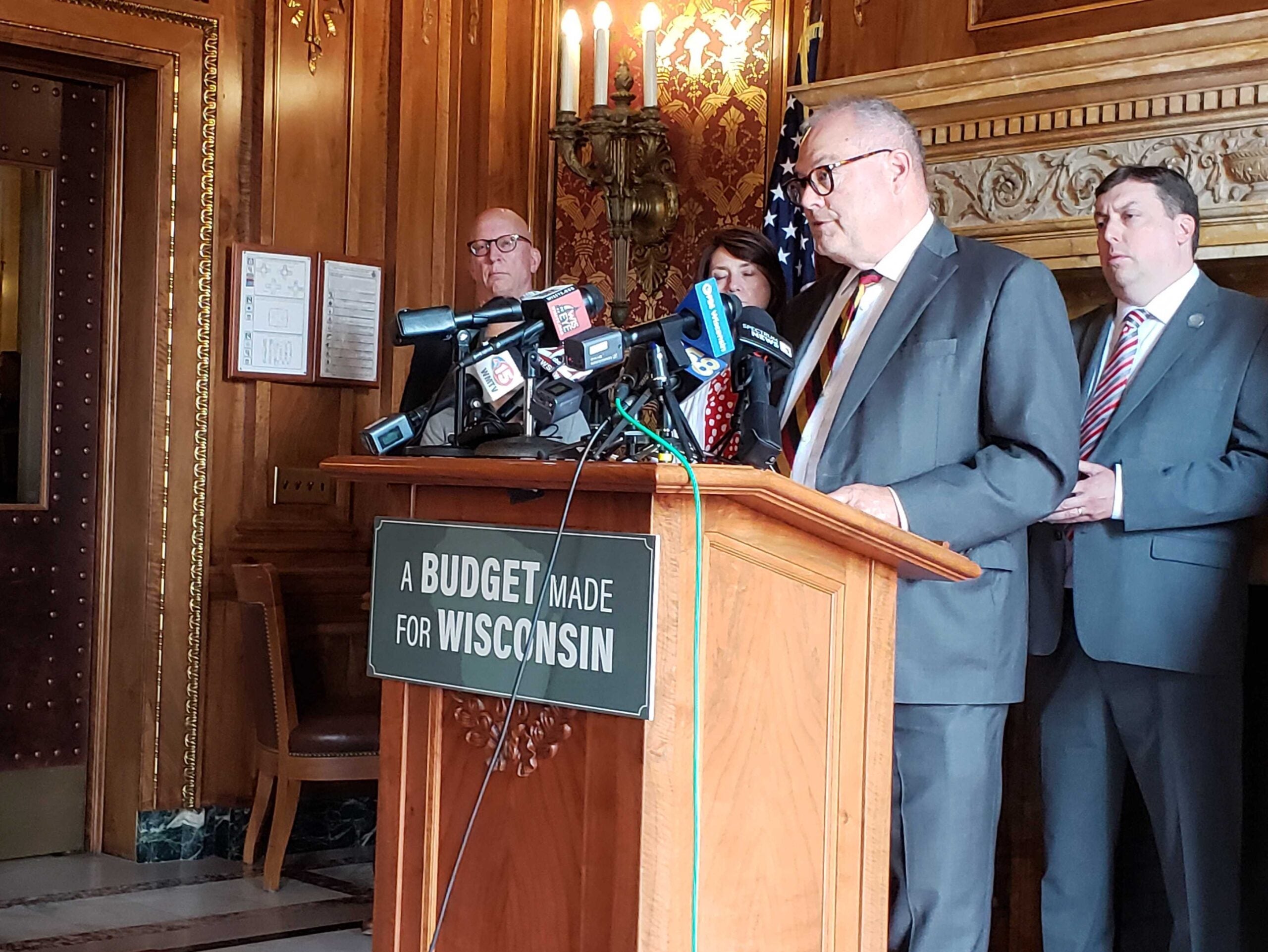
The state’s two middle brackets, which are currently 4.65 percent and 5.3 percent, would merge into one, meaning individuals who earn between $13,810 and $304,170 would pay a marginal rate of 4.4 percent.
The bottom tax rate, paid by people who earn up to $13,810, would drop slightly from 3.54 percent to 3.5 percent.
Democrats released a tax distribution table ahead of the vote showing what the change would mean for people at different income levels. For Wisconsin’s median household income, which is about $67,000, income taxes would be cut by about $250. For a handful of the state’s wealthiest residents, those who earn more than $75 million, 11 people would each see tax cuts of $1.8 million.
“This is blowing a giant hole in our budget in perpetuity,” said Sen. Kelda Roys, D-Madison. “We are squandering this incredible opportunity to help put our state on a path to growth and thriving … And not only are you squandering it today, you’re making it impossible for us to ever have it tomorrow.”
While Republicans and Evers have negotiated on some recent high-profile issues, like an overhaul of the state’s local government funding and a rewrite of its alcohol laws, GOP lawmakers made clear they did not consult the governor when it came to their tax plan.
Evers, who has one of the most powerful partial veto pens in the nation, could reject some, or all of the GOP tax cut, depending on how it’s worded in the final budget that reaches his desk.
“That’s always a possibility,” said Marklein. “We made tax cuts last time, and, you know, the governor approved them.”
The budget Republicans sent Evers two years ago would have cut income taxes by $2.75 billion. Evers surprised many Republicans when he used his partial veto pen to scale it back only slightly, still cutting taxes by more than $2 billion.
Asked for comment on the latest plan, Evers spokesperson Britt Cudaback pointed to a tweet showing the size of the tax cut for wealthier taxpayers.
Evers “believes that when we deliver tax relief, it should be real, responsible and targeted to the middle class. The GOP is doubling down on tax breaks for wealthy millionaires and billionaires instead of prioritizing relief for working families,” read the tweet from Cudaback.
Despite record budget surplus, GOP would cut state funding for the UW
Republicans also cut $32 million from the University of Wisconsin System, taking the rare step of voting to force the UW to eliminate nearly 190 positions that perform functions related to diversity, equity and inclusion.
Republicans on the budget panel said that university work around DEI amounts to discrimination against certain groups, including conservative, white and male students.
“We’re not going to put one race above the other, we want to put everybody on the same footing,” said Rep. Alex Dallman, R-Green Lake. “(In) my time at UW Madison, I wasn’t afraid to raise my voice as a conservative student. But at the same time, I know many of those who are.”
Ahead of the vote, Sen. LaTonya Johnson, D-Milwaukee, who is Black, questioned why Republicans would defund diversity training when racial disparities persist in Wisconsin.
“This is an attempt for Republicans to act as if there aren’t any problems whatsoever,” Johnson said. “This is a way for them to whitewash.”
According to an analysis by WisPolitics, DEI positions throughout the UW System include administrators, teaching specialists, compliance officers and service coordinators for underrepresented groups on college campuses, including veterans. These positions are spread across all 13 UW campuses, with four positions dedicated to the entire system.
Democrats argued those positions help recruit and retain underrepresented students to universities, and that targeting DEI programs reflects a maneuver in the culture wars.
“Those are human lives, and they have mortgages, and they have kids, and they have car payments, and they won’t be able to make those because of what you’re going to do today,” McGuire said. “You’re holding funding hostage … so you can make a political point.”
According to an Associated Press analysis, at least a dozen states have seen Republican efforts to limit DEI work in colleges and universities.
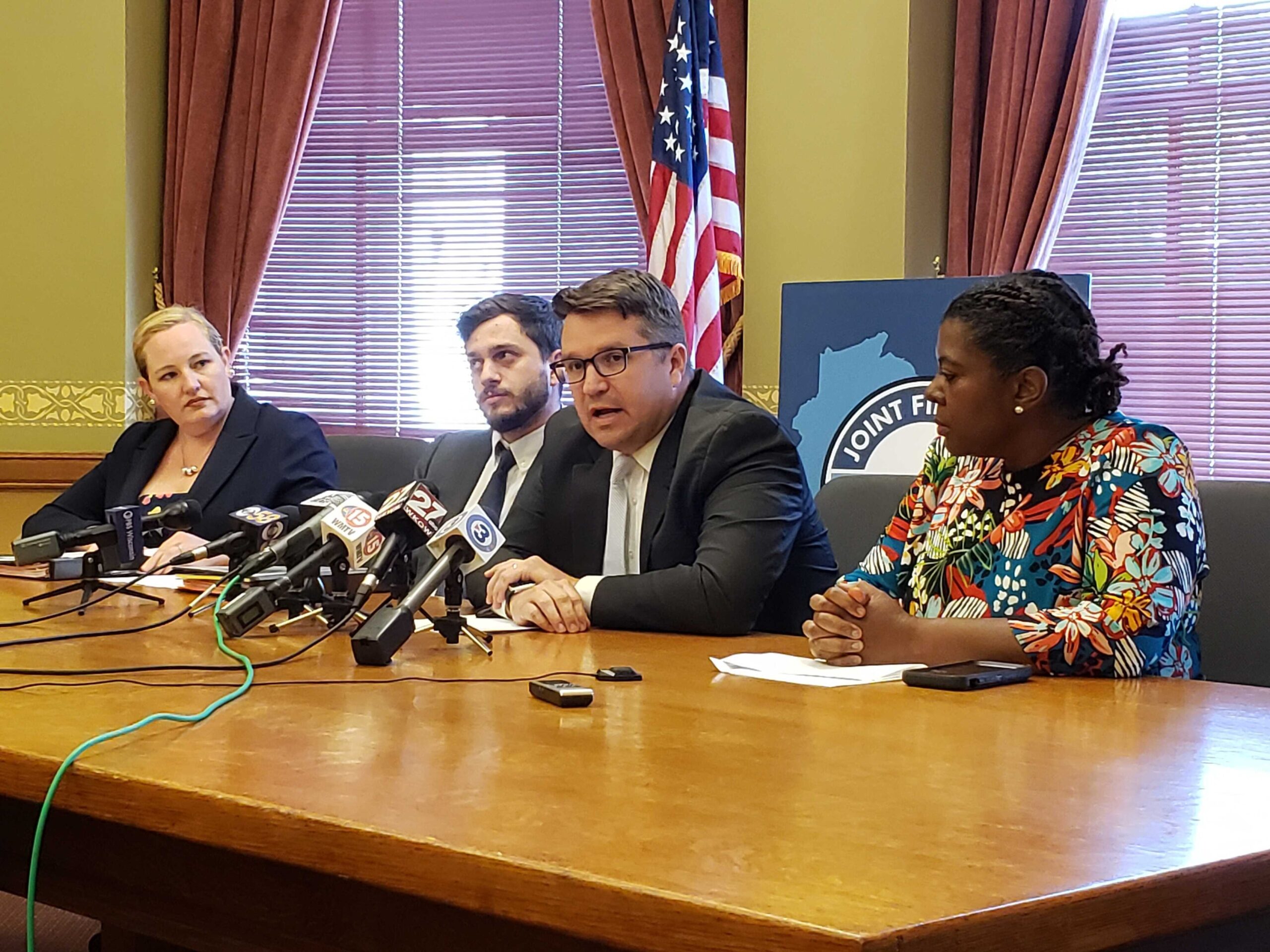
The motion passed by Republicans raised the prospect that the UW could recover its $32 million cut if it came back to lawmakers with a plan to spend the money on workforce investments instead. Whether or not to release the funding would be up to the Joint Finance Committee.
“They need to refocus their priorities on being partners and developing our workforce,” said Rep. Mark Born, R-Beaver Dam in a press conference before the vote.
Republicans on the budget panel also voted earlier this month to reject funding for a new engineering school at UW-Madison, which the UW System had described as its top priority.
In a written statement issued after the GOP plan was released, UW-Madison Chancellor Jennifer Mnookin questioned the decision to cut funding at a time when the state’s surplus has never been larger, stressing the importance of DEI initiatives.
“These programs play a critical role on campus and help students from a wide variety of backgrounds succeed in college, including veterans, students with disabilities, first-generation students, and underrepresented minority students,” Mnookin said. “They also support the wellbeing of faculty and staff.”
UW System President Jay Rothman referred to the vote as a missed opportunity and a significant setback in the war for talent.
“Investments at even half the rate of inflation would have afforded us a real opportunity to develop the talent that tomorrow’s workforce desperately needs,” Rothman said. “Instead, continued erosion of state investment will diminish student access and affordability at our public universities.”
Both Rothman and Mnookin praised a separate vote by the budget panel that would increase state and university employee wages by 4 percent on July 1, 2023, and another 2 percent on July 1, 2024. Those increases would affect employees of Wisconsin Public Radio.
The budget committee’s action also comes as in-state tuition for the UW system is due to increase for the first time since Republicans froze tuition a decade ago. In March, the UW System Board of Regents approved an average increase of about 5 percent across the system, to commence this fall.
According to the Legislature’s nonpartisan budget office, the UW’s tuition hikes are projected to generate $38 million annually for the university. When taken together with increased fees proposed by the University System, UW revenue would go up by a projected total of nearly $76 million per year.
In addition on Thursday night:
- Lawmakers approved $525 million to finance a series of loan programs for housing development. Those bills were recently passed by the Legislature and signed into law by Gov. Tony Evers earlier on Thursday. Those loan programs would go toward converting commercial properties to housing, developing housing in Wisconsin downtowns and support some housing rehabilitation.
- GOP lawmakers approved wage increases for corrections workers, from a base rate of $20.29 to $33 an hour. That’s the same number that Evers requested in his budget. There is a 33 percent vacancy rate in those positions across all adult facilities, according to the Legislative Fiscal Bureau, as the state’s incarcerated population is growing.
The budget now moves to the full Legislature, which is expected to pass it next week. While the state’s next fiscal year officially begins on July 1, state spending continues at current levels until a new budget is signed into law.
Editor’s note: Wisconsin Public Radio is a service of the University of Wisconsin-Madison and the Wisconsin Educational Communications Board.
Wisconsin Public Radio, © Copyright 2025, Board of Regents of the University of Wisconsin System and Wisconsin Educational Communications Board.



